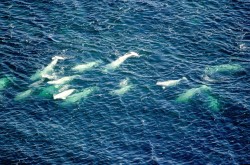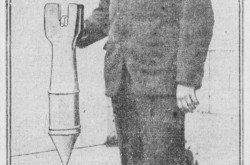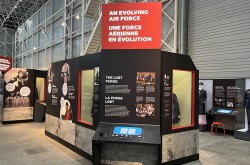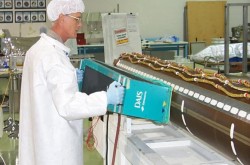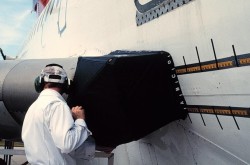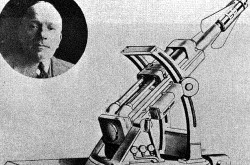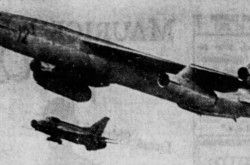Legacy Series Episode 5 - Collateral Damage
In Episode 5, RCAF veterans and civilians describe the sobering realities of war. From the terrible fear experienced by flyers and civilians alike, to German sieges and food drops by the RAF and RCAF, their firsthand accounts are both touching and sobering, bringing history to life in an often moving way. Topics include civilian starvation in Europe, RCAF prisoners of war, the horrors of concentration camps, and the joy of VE Day.
The interviews are interspersed with archival photographs and film footage. Scenes between Cadet Andy and Captain Johnny C provide context and additional information on what it was really like to go to war.
Transcript
0:12
We never lost faith in prison camp.
0:15
That’s one thing I noticed: people always look forward to something better.
1:29
This is near the end of the war, when we were in Eindhoven, Holland.
1:33
We were listening to— We had a little small radio,
1:38
and we got Arnhem Mary on the radio,
1:42
and she said, “We understand there’s a Canadian squadron in Eindhoven, Holland.”
1:48
And she said, “This is not your war, you know.
1:51
You should go home.
1:52
We feel so sad for you fellas, but maybe we could come over and wish you Merry Christmas.”
2:00
So we all laughed; we thought that was a big joke.
2:02
The next morning, there was thirty-five German aircraft over us at six o’clock in the morning,
2:09
and I was down having a shave when they passed over.
2:13
I thought it was our aircraft taking off.
2:15
I went out and I looked, and I was still shaving, and I said, “Boy, aren’t they low!
2:19
By golly they’re so low!
2:22
Holy smokes; they’re not ours!”
2:25
And so they damaged the entire field.
2:29
But anyways, we were all out there after they left.
2:32
And the planes are burning and— One of our fellas, who wasn’t really hit badly,
2:38
but he had enough blood on his face, he said, “Take my picture.
2:42
I want to send it home to my wife.”
2:45
So I said, “Come over by this aircraft, I’ll take your picture!”
2:50
I was never under guns firing at me, except that one day.
2:55
I showed you the pictures where we were strafed.
2:58
I was scared.
2:59
I cried.
3:00
I fell down, busted my chin, and all the guys were telling me to get into the slit trench.
3:07
I was really scared.
3:09
I had to say, “But you’re lucky: you’re not carrying a gun, and you’re not a hundred
3:15
miles up there; you’re a hundred miles back here!
3:18
And nobody’s firing guns at you.
3:20
Those guys are getting killed, so shut up!”
3:25
I have to insist: I was in a war but I really wasn’t in a war.
3:29
The guy that was on the front lines or landing or shooting guns, he was at war.
3:36
But I was in a war, and I grew up.
3:46
I was just a kid when I first flew this Lancaster.
3:54
Now I feel 95-years old…War does make men out of boys.
4:01
But the problem is, there are some who refuse to grow up.
4:05
And that can be their downfall.
4:07
What do you mean by that?
4:09
What I mean is…boys your age feel indestructible.
4:13
Like nothing is going to hurt them.
4:15
So they take foolish risks.
4:17
Doesn't taking foolish risks sometimes win medals?
4:21
But more often than not, you loose a limb, an eye, or even your life.
4:27
You have to be smart in war.
4:32
That only comes with experience.
4:35
So who should fight wars, old wise men?
4:39
No.
4:41
It’ll be you.
4:43
Young men fight wars Cadet.
4:46
Maybe not.
4:48
Come again?
4:49
You see…just like how the Second World War was light years ahead
4:53
of the First World War, wars today are too.
4:56
Soon technology might just remove humans off the battlefield altogether.
5:19
I forget our target that night.
5:21
I think our target was Merseburg, an oil refinery near Leipzig.
5:26
We’d dropped our bombs.
5:28
It was about a half an hour after we were shot down.
5:31
It happened very quick, and I was just lucky.
5:33
I really shouldn’t have got out—really—because I was supposed to go out of the front end
5:37
of the aircraft, and the bomb aimer and the engineer were supposed to go ahead of me;
5:43
but they couldn’t get the darn hatch opened.
5:46
So I said to myself, well I’m not going to get out that way; so I went back and stood
5:49
behind the pilot.
5:50
One of the windows, right there, about that size, just blew open.
5:56
I pulled myself up, jumped out, pulled my parachute and the first thing I know, I was
6:01
floating in the air.
6:02
At about 20,000 feet.
6:04
The parachute worked perfectly.
6:06
The first thing I know, I was floating (laughs).
6:08
My first impression is that I was going up, but gradually I could see I was going down.
6:13
And I was a bit concerned, because I could still hear
6:15
the fighter planes, still flying around.
6:17
I thought maybe he’d give me a burst, but I think he ignored me—I think.
6:22
Then I landed in trees.
6:24
And they captured me.
6:26
They took me to a farmer’s house.
6:29
A very nice farmer.
6:31
This farmer, luckily he could speak English.
6:34
But he was so, so nice.
6:37
A nice fella to talk to.
6:39
And I wanted to give him my watch and my wallet,
6:44
because I didn’t want the Germans to get them.
6:47
He said, “Oh no, I can’t take that.”
6:48
He says, “If I took that, and the Gestapo came in there and found that on me,” he
6:53
says, “they wouldn’t ask any questions.”
6:54
He says, ”they would just shoot me.”
6:56
He was scared of the Gestapo—so scared.
6:59
But anyway, he was very nice to me.
7:02
He said, “What you need is a drink of schnapps!”
7:05
“You think so?”
7:07
“Yeah!”
7:07
So he went and got the bottle of snaps, and he handed the glass to me.
7:12
I had never drunk snaps before.
7:13
I took a drink: Oohh, down my throat.
7:16
I said, ”That’s too strong!”
7:18
He said “Oh No!”
7:18
He took the glass and drank it himself (laughs).
7:21
The next morning, the local burgermeister came, and they took me to jail.
7:26
But first, before they took me to the jail, they took me to where the plane had crashed,
7:31
and they told me then that all the other six guys were dead.
7:36
They put two guards on me, and took me to the railway station in Frankfurt.
7:41
From there, I was going to the interrogation centre at Dulag Luft.
7:46
When we were in the railway station, there was an air raid on.
7:49
And, of course, all the people were running in and going to the air raid shelter.
7:52
We had to go down steps to get to the shelter.
7:55
And as we were going in, people coming in, they could see me, and I could tell by the
8:00
look on their faces they weren’t too happy.
8:02
They looked at me—and they said, oh, terror figure, you know.
8:04
And, of course, some of these people, I could see their point, you know: a lot of them had
8:07
been bombed before and maybe lost relatives,
8:10
and they wouldn’t be thinking too highly of me.
8:12
So what the two guards did: they put me in the corner, and stood in front
8:16
of me so the people couldn’t see me as they went down the steps.
8:20
And we got out of there without incident.
8:22
And when the air raid was over, we got on a small train, I think, and went to the interrogation
8:28
centre which was very close to Frankfurt.
8:30
There was one young German officer.
8:33
He spoke very good English.
8:35
He got very upset; he more or less threatened me, but the Geneva Conventions said all we
8:41
needed to tell them was our name, our number and our rank.
8:44
That’s all I told them.
8:45
I stuck to that.
8:47
I could tell by the way he was talking that he knew a lot more about our squadron
8:52
than maybe I thought I knew myself.
8:56
The food was terrible.
8:59
But you must remember: at that time, Germany had no food.
9:03
They were right down to rock bottom.
9:05
You know, the general public was starving, too.
9:10
When you’re hungry, you’ll eat anything.
9:12
I remember once (laughs) we were on the march; I got into this farm house.
9:19
I don’t know how I got there, but I did.
9:21
And there was this trough there, and the pigs were eating this stuff.
9:24
I looked down, picked it up;
9:27
it looked pretty good, so I thought I’d have some.
9:29
I ate some; it was pretty good! (laughs) Of course, I have a nature that would rather
9:35
be looking on the bright side, you know, seeing the humour of things.
9:41
Maybe that’s what got me through the war.
9:43
I don’t know!
9:48
I don’t get it.
9:49
How can anyone keep positive while fighting in a war?
9:53
Let me see if I can explain it to you.
9:56
We go through different hells all the time in war.
10:02
And when an act of kindness from a fellow soldier, or a civilian, or even the enemy
10:06
happens, it reminds us that we’re all human.
10:11
And are still capable of compassion.
10:13
That’s something positive, don’t you think?
10:16
I think the most positive thing would be not to kill one another.
10:21
Tough to do in war.
10:41
I’d say it was about the third year into
10:44
the war when we started to feel the pinch.
10:47
You went to the soup kitchen, you got a spoonful of mostly soup—kind of.
10:55
If you’ve ever seen a rotten potato, try to eat that!
10:59
Yeah.
11:00
That was what the soup was made of.
11:02
Wheat flour, if you have a seed, if it’s a year old or a couple of years old, maggots will form in there,
11:10
and this is what they made porridge out of.
11:13
I had a goldfish and I was eating at the kitchen table and the kids—hey, we would eat anything.
11:23
The Germans had set up on the bridges to prevent people from going to the farmers.
11:29
They let people go out, in the beginning, and then, when they came back, with their
11:35
bicycle bags full of—you know, milk, potatoes and whatever—
11:39
you had some vegetables in '43 about,
11:43
they were stopping them on the bridges (chokes up).
11:52
They’d take the food, and drop it over the bridge in the water while you were starving.
11:59
Yeah, that was mean!
12:03
My mother was about 230 pounds when the war started
12:06
and she was 98 pounds when the war finished.
12:10
It would have been a matter of a week or fourteen days, and she wouldn’t have made it.
12:20
What we do to each other in times of war is disgusting.
12:24
To starve people who wanted no part of war is so cruel.
12:28
Yeah it’s cruel.
12:31
Horrible things happen in war all the time.
12:34
They bomb us.
12:35
We bomb them.
12:36
They sink our ships.
12:38
We sink theirs.
12:40
They kill our soldiers.
12:41
We kill theirs.
12:42
They shoot down our planes.
12:44
(in unison): We shoot down theirs.
12:45
I get it.
12:46
I get it.
12:48
It’s a vicious circle Andy.
12:49
Yeah.
12:52
One that goes around and around.
13:12
One thing I did do—and I’m quite proud
13:13
of it, too, and it really makes me feel good when I think of it—we went over, and the
13:17
Dutch were starving; we took food over, and dropped it to them.
13:22
The Germans had said that they wouldn’t send up any fighters or anything;
13:27
they allowed us to go in and drop the food.
13:31
And as we flew over Rotterdam, coming to the drop zone, and
13:36
there were hundreds, hundreds of people they were all lined up, and they were waving at us.
13:42
And we dropped our food, and wiggled our wings, and set tail for home.
13:50
So I think they really appreciated that!
13:55
It didn’t take long for people to catch on.
13:58
The big apartment buildings: they were on the roofs, and they were waving.
14:02
The nice part was, you know,
14:08
if you see the Lancaster, the airplane, at the tail end,
14:14
you see those guns (makes waving movement like the guns), he was waving with his guns,
14:20
(chokes up) double guns.
14:26
The Dutch people were wonderful.
14:29
They would come up to you on the street—of course, we wore our berets and everything.
14:33
They knew who you were, but they’d come up and give you a hug
14:37
—kiss you, and everything else.
14:41
Makes me cry just to think about it.
14:46
Anyway, you’d go into a restaurant sometimes, and they wouldn’t even charge you.
14:53
Wonderful people.
14:56
And they really liked the Canadians.
15:03
So even in war, bitter enemies can do the right thing?
15:07
Do something good for each other?
15:09
Yeah, but usually it comes at a cost.
15:11
It shouldn’t be that way though.
15:13
Doing something good should come with no strings attached.
15:17
What world do you live in?
15:19
Eventually, everything comes at a cost in this life.
15:39
I received a first letter from my mother,
15:42
“Everything is fine, except your father and my youngest brother disappeared.”
15:50
Later on, I found out that they were killed in Auschwitz concentration camp.
15:59
And we got to a place called Belsen.
16:02
There was a German concentration camp.
16:05
We went in to this concentration camp, as we were allowed to do.
16:12
And to make us safe in there—because there was typhus in the camp—they sprayed us with
16:22
white powder, which turned out to be DDT.
16:27
They put it down our clothes, they put it in our hair—they put it all over us and so on.
16:33
What we saw in there was very traumatic.
16:39
The people—mostly Jewish
16:43
prisoners that had been in there—were thin, thin, people dying.
16:49
Some would be walking along, and just fall over.
16:53
But we saw what was there.
16:59
And I never forgot that.
17:01
Never!
17:02
I hated the Germans.
17:05
I hated them with intensity.
17:09
I didn’t know about what happened.
17:12
I really didn’t!
17:14
I have never seen anybody doing something bad like that.
17:20
I couldn’t imagine it.
17:22
But then, of course, I had to realize that it was the truth.
17:26
They showed us the pictures, and
17:31
it is terrible. It should never have happened,
17:33
and I cannot understand who is doing that.
17:38
It’s horrible.
17:40
It’s horrible.
17:42
When I got home, I found out my daughter was doing— Tracing the family tree, and so on,
17:50
and what does she find out?
17:53
That I had more German in me than British English or Scotch or French (laughs).
18:03
Big joke!
18:07
We are all cut from the same cloth.
18:09
How can fellow humans beings have so little regard for life?
18:13
How can someone send people into a gas chamber?
18:16
What will it take to change things?
18:19
I’m just a pawn in this war Andy.
18:21
I don’t know…a miracle?
18:24
You tell me.
18:44
We were celebrating.
18:49
That evening, everybody was so happy, and the civilians were rejoicing.
18:57
They were hoping that the rations would be over, and they could start living again.
19:03
Everybody was excited. Yeah!
19:05
There was excitement in the air.
19:06
Well the war was over here, too.
19:10
People in Montreal went crazy, and the churches were all filled up.
19:16
It meant the end of our being away, was what it mostly meant to us.
19:24
On our base in our part of Gander, I don’t recall even knowing the war was over.
19:35
So there definitely was no great celebration, because we were still doing shift work.
19:44
The planes were still coming and going.
19:47
The people in Ottawa all congregated downtown
19:52
for a huge rally celebrating the end of the war.
19:58
It was packed downtown.
20:02
Guys were drinking beer, and guys in their uniforms and all this.
20:05
And the women were kissing the guys in their uniforms, and all this kind of nonsense.
20:10
And of course all the beer parlours were loaded, you know.
20:17
It went on all night long.
20:20
There was an awful lot of hangovers the next day.
20:23
So I’m alone in this big Nissen Hut, all on my own, and it’s VE Day, you know;
20:29
I can still remember that to this day.
20:32
And I’m feeling very sorry for myself,
20:36
being stuck in this Nissen hut, with nobody there but me.
20:41
So I just went to bed. (laughs)
20:45
I think we’re still celebrating.
20:47
A lot of dancing.
20:49
Street dancing was all over.
20:50
That lasted a couple of weeks, actually.
20:52
The Canadian soldiers and that was all in the street squares, and they were out with
20:57
the bands and yeah, that went on for a long time.
21:01
All I remember is that there’s no flying.
21:04
Oh well, now what do we do?
21:06
There’s no flying?
21:08
Holy crow!



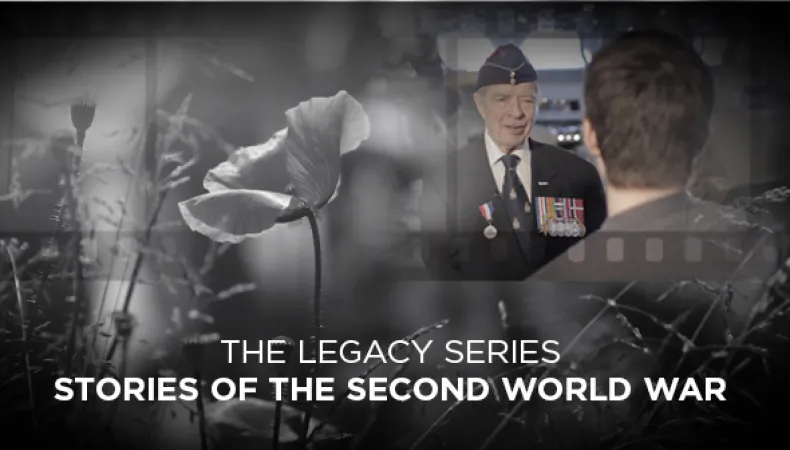

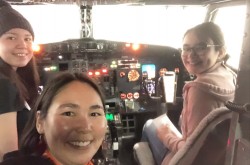
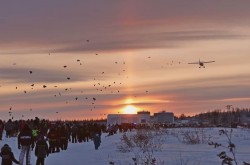

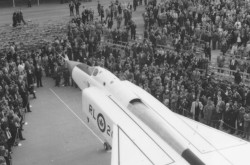
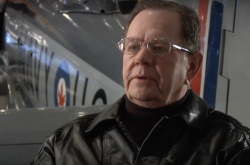




![A block of photographs showing some of the people involved in the bombing of beluga whales in the estuary and gulf of the St. Lawrence River. Anon., “La chasse aux marsouins [sic]. » Le Devoir, 15 August 1929, 6.](/sites/default/files/styles/thumbnail_7/public/2024-09/Le%20Devoir%2015%20aout%201929%20page%206.jpg?h=584f1d27&itok=TppdLItg)
